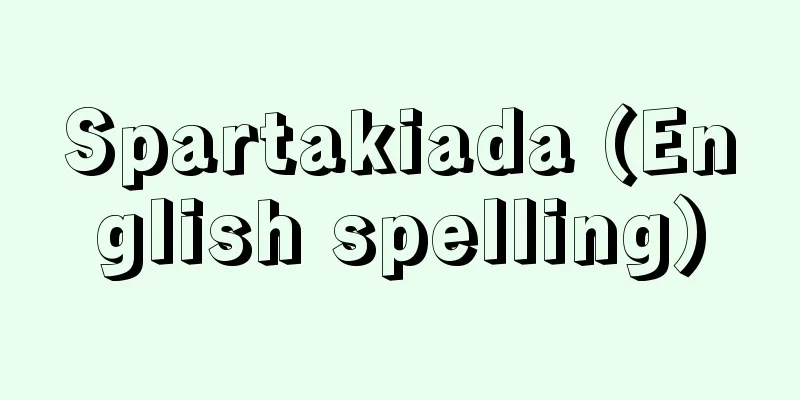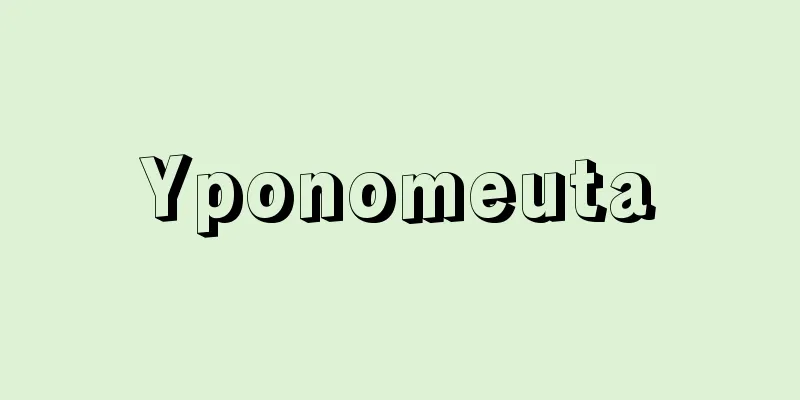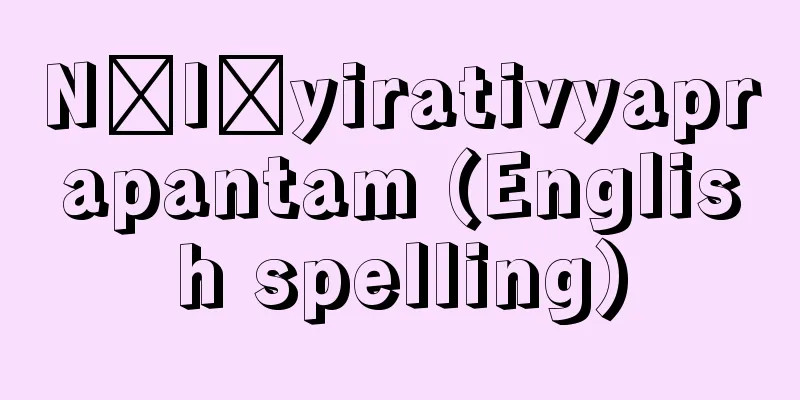Spartakiada (English spelling)

|
A multi-ethnic sports festival held every four years in the Soviet Union. It was held the year before the Olympic Games and was a major national event that also served as a venue for selecting Olympic athletes. The Spartakiade is interpreted as a festival of youth, peace, and ethnic friendship, and continues to exist today in the Russian Federation and elsewhere as the Community Spartakiade. The Spartakiade was named after Spartacus, a Thracian gladiator and slave leader who rebelled against Rome (73-71 BC). It was a mass athletics system that was part of the policy of the Soviet Union and other socialist countries to guarantee the right to rest and health protection for working people and to promote harmonious education for the people. The main purpose of holding the Spartakiade was to widely stimulate interest in sports among the residents and to discover talent by popularizing sports. It was intended to train excellent athletes and demonstrate the beauty and health of human collective actions, as well as the strength and unity of young people to the audience. The structure of the Spartakiade corresponded to the national organization of the Soviet Union, and it was held at the units of villages, towns, counties, prefectures, districts, republics, and federations. The standard of sports competition in the Spartakiade was extremely high, and the mass games, which were a metaphorical expression of socialist struggle and victory, made it an ideal place for an effective demonstration of socialist power. The first Soviet Union Spartakiade was held in the summer of 1956, the year of the Olympic Games. The second was held in 1959, and since then it has been held every four years, the year before the Olympics. This Spartakiade was planned as the largest multi-sport competition in the Soviet Union, gathering in one city the winners of the national team selection competitions held in the constituent republics and regions of the Soviet Union. Held the year before the Olympics, the Spartakiade played an important role in predicting the performance of the Soviet Union's athletes at the Olympics one year later. Furthermore, the qualifying tournaments held throughout the Soviet Union became an important part of sports policies, as a powerful means of promoting and popularizing sports throughout the country. Regional qualifying competitions were open to not only sports club members but also residents of the same residential area, and various competitions such as the Physical Education Spartakiade of Trade Union Sports Associations, the All-Union Summer Sports Tournament, the All-Union Youth Sports Tournament, the All-Union Children's Spartakiade, and the All-Union Vocational and Technical School Spartakiade were also officially recognized as qualifying competitions. At the first Soviet Spartakiade, 142 new world records and 415 new national records were set, demonstrating to the world and the world the remarkable improvement in the competitiveness of the Soviet sports world in just a little over a decade since the end of World War II. The seventh Spartakiade final in 1979 served as a Moscow pre-Olympics, and many foreign athletes participated. The events held at this tournament included Olympic sports such as wrestling (free Greco-Roman), boxing, judo, cycling, water polo, gymnastics, rowing, canoeing, equestrianism, athletics, swimming (swimming and diving), modern pentathlon, shooting, archery, fencing, soccer, volleyball, handball, basketball, weightlifting, hockey, and sailing, as well as 30 other events including sambo, rhythmic gymnastics, tennis, and chess. Athletics also included the 800-meter relay and the 3,200-meter relay. In addition to the sports mentioned above, mass games such as orderly exercises, marching exercises, gymnastics, unaided exercises, and gymnastics were also held. Czechoslovakia also held a similar national sports festival every five years from 1955, one year earlier than the Soviet Union. In East Germany, the Spartakiade for children and adolescents was introduced in 1963 with the aim of supplementing sports education with competition and checking the level of technical ability. In East Germany, the tournament was considered the most important means of discovering sports talent. Such sports festivals are popular in socialist countries, and are also held on a large scale in China, North Korea, and other countries. On December 13, 1991, the 15 republics that made up the Soviet Union separated and became independent, and the sports world also transitioned to a community sports system, but after the Barcelona Olympics in 1992, Russia completely transitioned to a single sports system. Since the collapse of the Soviet Union, competitions such as the Workers' Spartakiad, Compulsory School Spartakiad, Siberian Winter Spartakiad, Community Spartakiad, Community Workers' Spartakiad, and Russian Workers' Winter Spartakiad have been held in Russia. [Yasuhiro Miwa] "Olympic Encyclopedia" edited by the Japanese Olympic Academy (1981, Press Gymnastika)" ▽ "Sports Science Encyclopedia" edited by Kishino Yuzo (1981, Press Gymnastika)" ▽ "Sports Science Dictionary" supervised and translated by Asaoka Masao (1993, Taishukan Shoten)" ▽ "Sato Etsuro, "New Russian Sports Research: The Establishment Process of the New Russian Sports System" (1997, Fumaido Publishing)" [Reference] |Source: Shogakukan Encyclopedia Nipponica About Encyclopedia Nipponica Information | Legend |
|
ソビエト連邦で4年ごとに開催された諸民族を対象とした総合スポーツの祭典。オリンピック大会の前年に開催され、オリンピック代表選手選抜を兼ねる一大国家的行事であった。スパルタキアードは、青少年・平和・民族親善の祭典と解釈され、現在もロシア連邦などで共同体スパルタキアードなどとして存続している。 ローマに対抗して反乱を起こした(紀元前73~前71年)剣闘士や奴隷の指導者であった、トラキア人のスパルタクスSpartacusにちなんだ名称で、ソビエト連邦およびその他の社会主義諸国の勤労者の休息と健康保護権の保障、国民の調和的教育を図る政策の一環である大衆競技制度であった。スパルタキアード開催の最大の目的は、広く住民のスポーツに対する関心を喚起し、競技を普及することによって、タレントを発掘しようとすることにある。優秀な選手養成と人間の集団行動の美しさや健康美、さらに青年の力と団結を示威的に観衆に訴えようとするものである。スパルタキアードの構成はソビエト連邦の国家組織に対応しており、村、町、郡、県、地区、共和国、連邦それぞれの単位で行われていた。スパルタキアードにおけるスポーツ競技水準はきわめて高く、それは社会主義闘争と勝利の比喩(ひゆ)的な表現であるマス・ゲームによって、社会主義権力の効果的なデモンストレーションとして格好の場となった。オリンピック開催年の1956年夏に第1回ソビエト連邦スパルタキアード競技大会が開催された。その後、1959年に第2回が開かれ、以後4年に一度オリンピックの前年に開催されるようになった。このスパルタキアードは、ソビエト連邦全土の構成共和国と各地域で実施される代表選手選抜競技会の勝者を1都市に集め、ソビエト連邦最大の総合競技大会として企画された。オリンピックの前年に開催されるスパルタキアードは、1年後のオリンピックにおけるソビエト連邦選手団の実力を予想する重要な役割を担った。さらに、ソビエト連邦全土で開催される予選会は、全国にスポーツを宣伝・普及する有力な手段として、重要なスポーツ政策の一つとなった。地域における予選は、スポーツクラブ所属者だけでなく同居住区住民も参加でき、また労働組合スポーツ協会体育スパルタキアード、全ソ農村夏季スポーツ大会、全ソ青年スポーツ大会、全ソ児童スパルタキアード、全ソ職業技術学校スパルタキアードなど各種大会も予選として公認されていた。 第1回ソビエト連邦スパルタキアード競技大会では世界新記録142、全ソ新記録415が樹立され、第二次世界大戦後、わずか10年あまりの間のソビエトスポーツ界の競技力の著しい向上を国内外に示した。1979年の第7回スパルタキアード決勝大会はモスクワ・プレ・オリンピックを兼ね、外国選手が多数参加した。この大会で行われた競技種目は、レスリング(フリー・グレコローマン)、ボクシング、柔道、自転車、水球、体操、ボート、カヌー、馬術、陸上競技、水泳(競泳・飛込)、近代五種、射撃、アーチェリー、フェンシング、サッカー、バレーボール、ハンドボール、バスケットボール、ウエイトリフティング、ホッケー、ヨットなどのオリンピック種目およびサンボ、新体操、テニス、チェスの30種目であった。陸上競技には800メートルリレー、3200メートルリレーという種目も含まれていた。前記のスポーツ競技のほかに、秩序運動や行進運動、器械体操、徒手体操、手具体操などのマス・ゲームも行われた。 チェコスロバキアでもソビエト連邦より1年早い1955年から5年ごとに同様の国家的体育祭が行われた。東ドイツでは1963年に児童と青少年のスパルタキアードが、競技によってスポーツ教育を補充し、技術力レベルをチェックする目的で導入された。東ドイツではこの大会は、スポーツのタレント発掘上もっとも重要な手段とみなされていた。このような体育祭は、社会主義諸国において盛んで、中国、北朝鮮などでも大規模に行われている。 1991年12月13日、ソビエト連邦を構成していた15の共和国が分離独立し、スポーツ界も共同体スポーツ体制へと移行するが、1992年のオリンピック・バルセロナ大会後、ロシアは単独スポーツ体制へと完全に移行した。ソビエト連邦崩壊以降、ロシアでは労働者スパルタキアード、義務教育学校スパルタキアード、シベリア冬季スパルタキアード、共同体スパルタキアード、共同体労働者スパルタキアード、冬季ロシア勤労者スパルタキアードなどの競技大会が開催されている。 [三輪康廣] 『日本オリンピック・アカデミー編『オリンピック事典』(1981・プレスギムナスチカ)』▽『岸野雄三監修『スポーツ科学事典』(1981・プレスギムナスチカ)』▽『朝岡正雄監訳『スポーツ科学辞典』(1993・大修館書店)』▽『里美悦郎著『新ロシアスポーツ研究――新生ロシアスポーツ体制の成立過程』(1997・不昧堂出版)』 [参照項目] |出典 小学館 日本大百科全書(ニッポニカ)日本大百科全書(ニッポニカ)について 情報 | 凡例 |
<<: Spartan Education - Spartan Education
>>: Sparta - Sparta (English spelling)
Recommend
Roussillon (English spelling)
A region in the south of France. Former province n...
Iyo Nyudo Yoriyoshi - Iyo Nyudo Yoriyoshi
…In China, Meng Jiangnu, who was forced by the Fi...
Oda Shrine - Otajinja
This shrine is located in Oda-cho, Nyu-gun, Fukui ...
Ethiopian race - Ethiopian (English spelling) Athiopians
A Negroid race that is in the Caucasoid contact zo...
StG44 - STAGE G44
…During World War II, most of the rifles used by ...
Kanto Electric Industry Co., Ltd.
…In 1944, the company was liquidated and establis...
Shin Hiyoshi Gate - Imahiemonzeki
…The mountain name is Mount Nan'ei. It is als...
Battle of Stalingrad - Battle of Stalingrad
The Battle of Stalingrad (now Volgograd) took plac...
Specific charge - Hidenka (English spelling)
The ratio of a charged particle's charge e to...
Skutterudite
...In the Democratic Republic of the Congo in the...
Gasification of coal
It is a process in which coal is treated with ste...
Augustus III
...Already in 1525, the spread of Lutheranism had...
Laminaria religiosa (English spelling)
…[Yoshiharu Iijima]. … *Some of the terminology t...
Mount Gyokusen
A mountain in the western suburbs of Beijing, Chin...
Japan Industrial Bank [Stock] - Nihon Kangyōginko
One of the special banks. Established in 1897 unde...





![Nango [village] - Nango](/upload/images/67cc69b462e54.webp)



